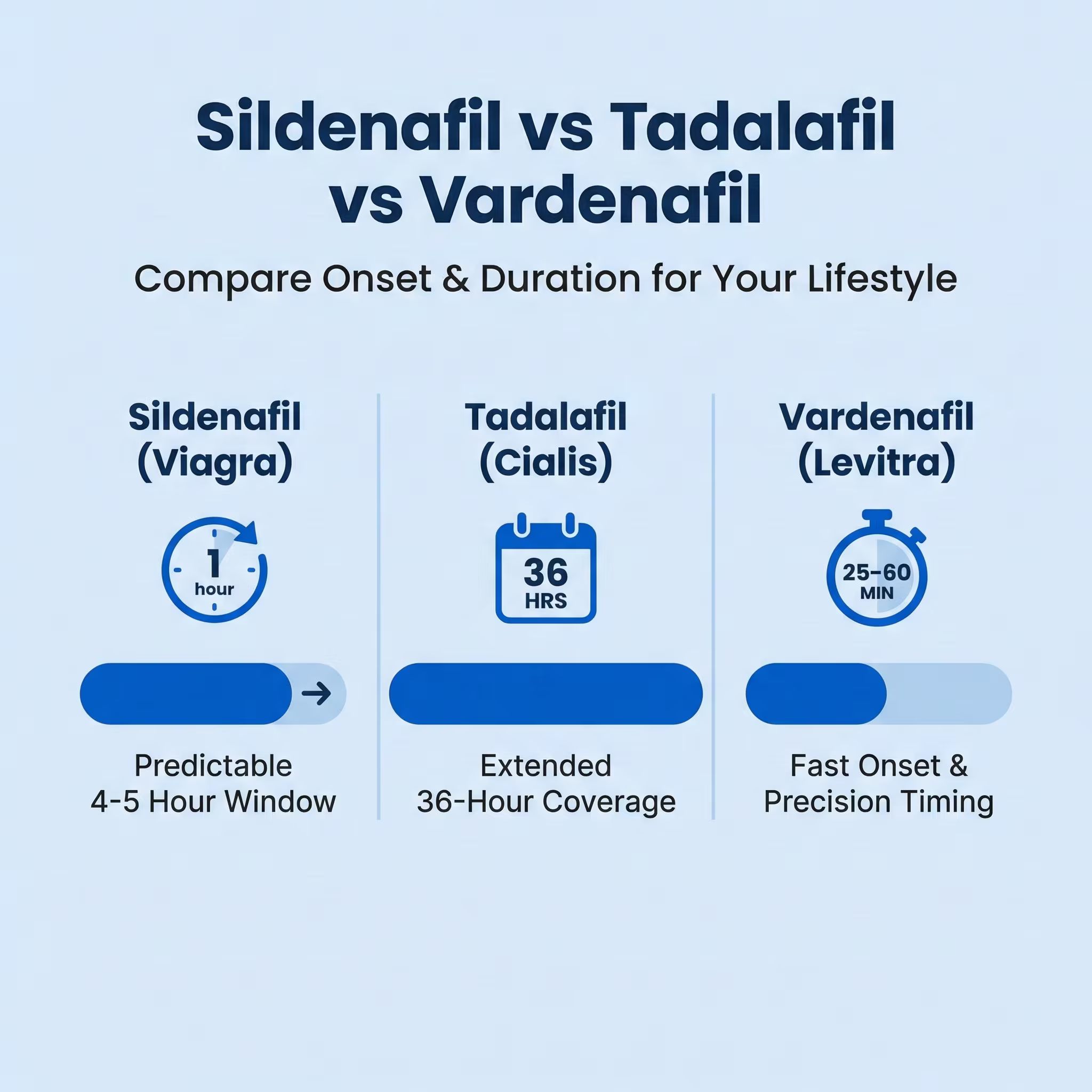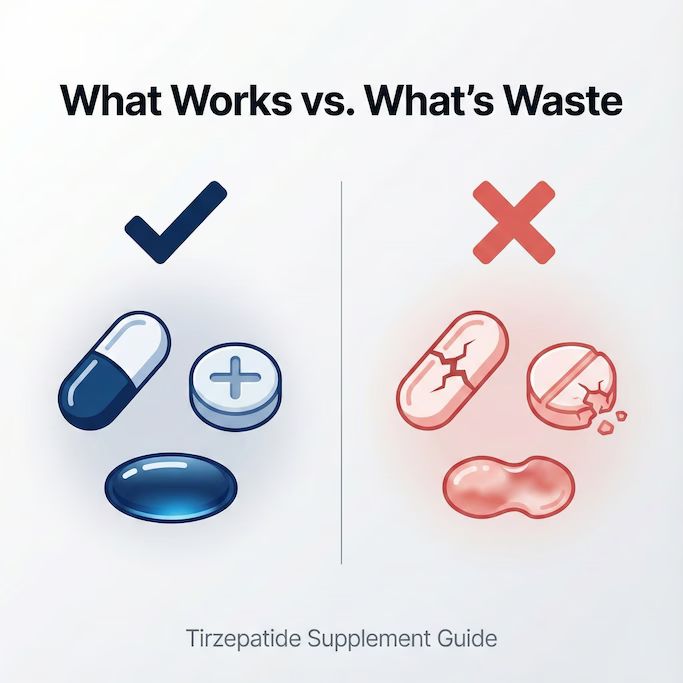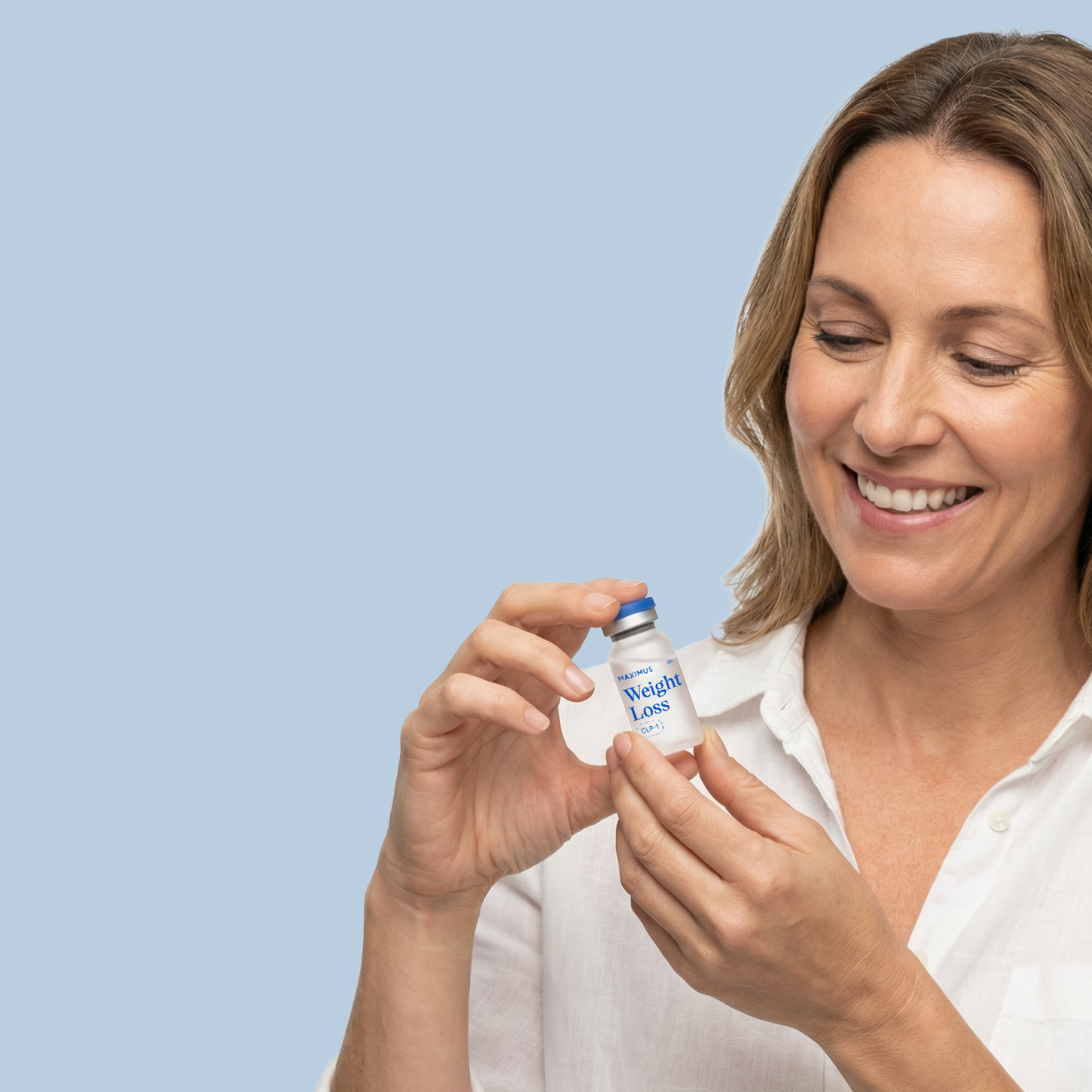Key Takeaways:
- Low testosterone levels may promote fat accumulation and make weight loss harder.
- Testosterone stimulates muscle protein synthesis, enhancing lean muscle mass.
- Excess body fat triggers inflammation that interferes with hormone production and metabolic function.
Weight loss can feel like an uphill battle — especially for men struggling with hormonal imbalances like low testosterone.
Testosterone plays a role in body composition, and low testosterone levels are often associated with increased body fat and reduced muscle mass.
For men struggling with weight gain that’s linked to lower than normal testosterone levels, testosterone replacement therapy (TRT) may offer a solution. Research shows that TRT can help improve metabolism, promote growth of lean muscle mass, and reduce body fat.
In this article, you’ll learn how testosterone replacement therapy (TRT) can transform your body composition and optimize your metabolic health.
1. Reducing body fat
Testosterone influences fat loss through a few different mechanisms.
Hormone balance
Hormone regulation is crucial for muscle development and fat distribution, but low testosterone can disrupt this balance, leading to muscle loss, metabolic changes, and increased fat storage.
Low testosterone may also contribute to insulin resistance, which can contribute to fat accumulation.
Excess fat, especially visceral fat, can exacerbate hormonal imbalances and inflammation, further impairing testosterone production and metabolic functioning.
Fat metabolism
Testosterone promotes fat metabolism by activating enzymes that drive lipolysis, which breaks down stored fat. Testosterone also reduces fat storage in cells and may inhibit the formation of new fat cells.
Together, these mechanisms play a role in regulating how the body stores and processes fat, potentially reducing body fat.
2. Muscle growth
Testosterone can play an important role in muscle growth, which can support body composition and metabolic health.
Testosterone stimulates muscle protein synthesis, which is the process through which the body repairs and builds muscle tissue.
Men with optimal testosterone levels may experience advantages, such as greater efficiency in developing and maintaining lean muscle.
Studies suggest that this can also improve energy expenditure and overall metabolic health.
3. Energy and activity levels
Testosterone impacts multiple physiological mechanisms that support energy levels and physical performance.
Men with low testosterone often report symptoms like fatigue, reduced motivation, and decreased physical activity. Hormone optimization can sometimes help.
Research shows that low testosterone levels are associated with decreased motivation and increased fatigue.
Testosterone replacement therapy may help improve mental and physical drive, which can motivate men to participate in more physical activities.
In clinical studies, participants taking TRT report improved mood, increased energy levels, and a greater desire to exercise regularly.
4. Metabolic health benefits
In some men, TRT can benefit metabolic health.Testosterone demonstrates a relationship with glucose metabolism in prediabetic males.
Studies show testosterone levels are associated with lower insulin resistance, reduced HbA1c, and more favorable glucose metabolism.
Muscle tissue uses glucose and fatty acids as fuel.
An increase in lean muscle mass may improve insulin sensitivity and glucose uptake, lowering the risk of metabolic dysfunction.
Long-term health outcomes
Testosterone optimization offers more than just metabolic benefits. Addressing low testosterone levels may also help manage risk factors for metabolic syndrome, type 2 diabetes, and potential cardiovascular complications.
While the current research is promising, more research is needed to better understand testosterone’s metabolic impact and how it impacts various aspects of physiological functioning, including fat loss.
Treatment considerations
TRT is most effective for men diagnosed with testosterone deficiency, or hypogonadism.
These men have low testosterone along with symptoms like fatigue, reduced muscle mass, and decreased libido.
Obese men may see additional benefits from TRT treatment.
To determine if TRT might be a good fit for a patient, healthcare professionals measure hormone levels and analyze symptoms.
Tracking progress is important. Physicians start with careful dosing, making adjustments based on patients' individual testosterone levels, clinical outcomes, risk factors, and goals.
Patient safety is a top priority during TRT. Potential risks warrant careful attention, including cardiovascular complications, prostate health concerns, and potential blood cell count changes.
However, regular communication between the patient and healthcare provider can help avoid side effects and manage side effects that do occur.
Unlocking peak performance through testosterone optimization
Men seeking to optimize their health can leverage TRT as a powerful tool for metabolic transformation, fat reduction, and muscle enhancement.
Addressing low testosterone goes beyond aesthetic goals. Improved hormone levels may also unlock increased energy, better workout performance, and associated increased Weight loss.
Maximize your transformation with personalized support from Maximus. Elevate your overall performance today.
References:
- Adams, J., et al. (2013). The influence of testosterone on brain activity in humans. Journal of Clinical Endocrinology & Metabolism. https://pmc.ncbi.nlm.nih.gov/articles/PMC3897047/
- Ahmed, S., et al. (2022). Testosterone and cardiometabolic health in men. Frontiers in Endocrinology. https://pmc.ncbi.nlm.nih.gov/articles/PMC9552794/
- Allan, C. A., & McLachlan, R. I. (2010). Testosterone therapy in men: Clinical outcomes and quality of life. The Medical Journal of Australia. https://pmc.ncbi.nlm.nih.gov/articles/PMC6189635/
- Bassil, N., et al. (2009). Testosterone and the metabolic syndrome. Therapeutic Advances in Cardiovascular Disease. https://pmc.ncbi.nlm.nih.gov/articles/PMC3296126/
- Chandran, U., et al. (2013). Endocrine regulation of metabolic homeostasis. Journal of Endocrinology, 217(3), R25. https://joe.bioscientifica.com/view/journals/joe/217/3/R25.xml
- Corona, G., et al. (2013). Testosterone deficiency and endothelial dysfunction: A comprehensive review. Endocrine Reviews. https://pmc.ncbi.nlm.nih.gov/articles/PMC3474619/
- Davidson, J., et al. (2017). Testosterone therapy and adverse cardiovascular outcomes. Journal of Clinical Endocrinology & Metabolism. https://pmc.ncbi.nlm.nih.gov/articles/PMC5800829/
- Drake, B., et al. (2021). Testosterone replacement therapy and prostate health: A review. Frontiers in Urology. https://pmc.ncbi.nlm.nih.gov/articles/PMC8813729/
- Ferrando, A. A., et al. (2005). Testosterone administration in healthy older men improves muscle performance and physical function. The Journal of Clinical Endocrinology & Metabolism, 90(3), 1502–1510. https://pubmed.ncbi.nlm.nih.gov/15983313/
- Goodman, N., et al. (2012). Testosterone and diabetes: Understanding the relationship. Diabetes Spectrum. https://pubmed.ncbi.nlm.nih.gov/23240002/
- Goodman, N., et al. (2012). Testosterone and diabetes: A comprehensive review. Diabetes Spectrum. https://pubmed.ncbi.nlm.nih.gov/23240002/
- Healthline. (n.d.). Low testosterone: Causes, effects, and treatment. WebMD. https://www.webmd.com/men/ss/slideshow-low-t-effects
- Jones, T., et al. (2022). Testosterone therapy and mental health outcomes. Endocrine Disorders. https://pmc.ncbi.nlm.nih.gov/articles/PMC8721233/
- Kang, J. Y., et al. (2016). The effects of testosterone therapy on bone density. Osteoporosis International. https://pmc.ncbi.nlm.nih.gov/articles/PMC4707962/
- Larsen, H., et al. (2008). Testosterone deficiency and fatigue in men: A retrospective study. The Aging Male. https://pmc.ncbi.nlm.nih.gov/articles/PMC2613279/
- Manning, J., et al. (2017). Testosterone and its impact on energy metabolism. Metabolic Disorders Journal. https://pmc.ncbi.nlm.nih.gov/articles/PMC5421125/
- Nelson, J., et al. (2013). Testosterone replacement therapy: A systematic review. Clinical Endocrinology. https://pmc.ncbi.nlm.nih.gov/articles/PMC3661116/
- Parker, J., et al. (1990). Effects of testosterone on erythropoiesis. Annals of Internal Medicine. https://pubmed.ncbi.nlm.nih.gov/2917954/
- Richards, A., et al. (2015). Testosterone supplementation in aging men: Benefits and risks. The Aging Male. https://pmc.ncbi.nlm.nih.gov/articles/PMC4154787/
- Richards, A., et al. (2015). Testosterone supplementation in aging men: Benefits and risks. The Aging Male. https://pmc.ncbi.nlm.nih.gov/articles/PMC4154787/
- Singh, A., et al. (2020). Role of testosterone in muscle regeneration. Journal of Clinical Endocrinology & Metabolism. https://pmc.ncbi.nlm.nih.gov/articles/PMC7772371/
- Vale Health Clinic. (n.d.). The link between testosterone and body composition. Vale Health Clinic. https://valehealthclinic.co.uk/the-link-between-testosterone-and-body-composition/





